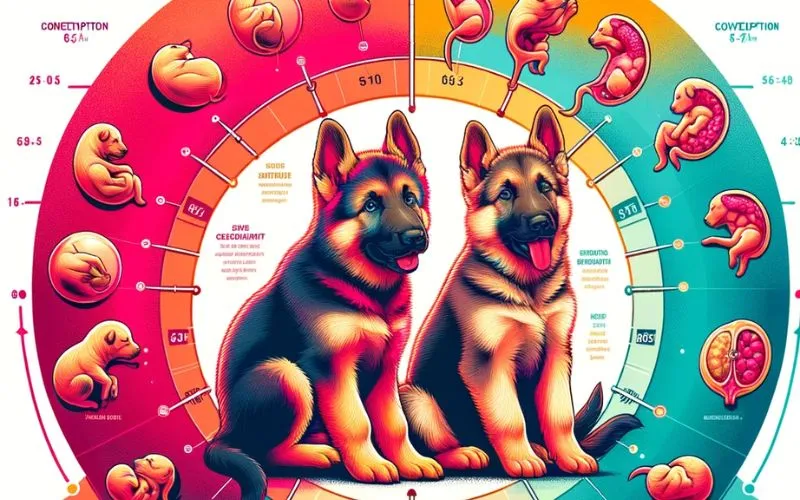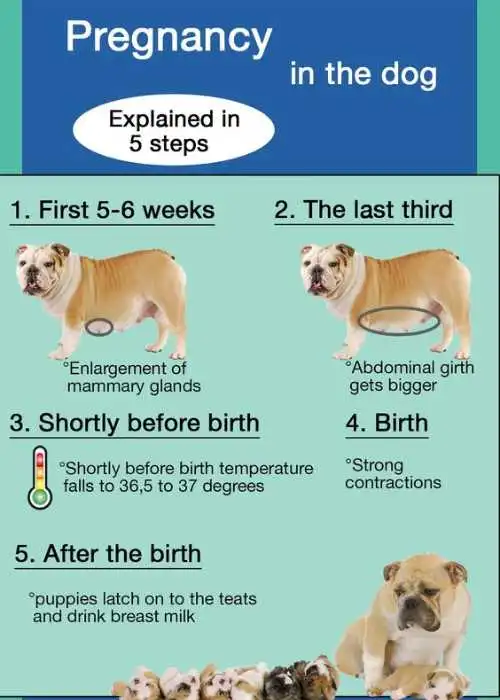Congratulations on the upcoming pitter-pattering of tiny paws in your house! Caring for a pregnant German Shepherd is both a joy and a life-enriching experience. The happiness of welcoming new fur babies can barely be put into words, but the responsibility that comes with pregnant German Shepherd care can be overwhelming at first.
As a mom-to-be myself, I know that the health of my dog and her puppies is the first thing on my mind. There are challenging yet rewarding days ahead as I imprint on my role, finding answers to ensure a smooth pregnancy. I’m here to navigate the multiple aspects of care to keep both mom and her babies healthy and content.
Signs Your Dog is Pregnant
1. Weight gain:
As the puppies develop, your German Shepherd will naturally gain weight. Monitoring her weight gain is essential to ensuring it’s on track.
2. Swollen stomach:
You might notice her belly swelling as the pregnancy progresses. This is a telltale sign of her body preparing for the new arrivals.
3. Increased Appetite:
Pregnant dogs often have an enormous appetite, as they are eating more than themselves.
4. Fatigue:
Don’t be surprised if your furry friend seems more tired than usual; growing puppies is exhausting work.
5. Irritability:
Hormonal adjustments could make a pregnant German Shepherd irritable. Be an affected person and provide her with the gap she desires.
6. Changes in Affection:
She may seek more attention and affection or might prefer to be left alone, depending on her mood.
7. Vomiting:
Some dogs experience morning sickness and may vomit due to hormonal changes or stress.
8. Decrease in Appetite: Despite an increased appetite earlier on, some dogs may experience a decrease in appetite later in their pregnancy or fluctuate between the two.
What To Do If Your Dog is Pregnant
When it comes to pregnant German Shepherd care, the first step is to confirm the pregnancy with a vet. Once pregnancy is confirmed, it’s critical to consult with your vet about proper nutrition tailored to support her through the pregnancy and lactation period. Regular veterinary visits will help monitor both the mother’s and puppies’ health, allowing for timely intervention if necessary.
Vet Consultation & Nutrition
Contact Your Vet: As soon as you suspect your dog may be pregnant, schedule a visit to the vet for confirmation and advice on proceeding with care.
Proper Nutrition: The vet will recommend a healthy diet and weight-reduction plan that satisfy the dietary needs specific to a pregnant German Shepherd. Nutrition for the duration of pregnancy is essential for the health of the mother and the proper development of domestic dogs.
Creating the Right Environment & Monitoring Health
Nesting Area: Prepare a comfortable, quiet, and warm nesting area for your dog to relax in, ensuring it’s away from high-traffic zones to limit stress.
Limited Contact: Keep your pregnant German Shepherd away from other dogs to prevent any risk of injury or infection that could complicate the pregnancy.
Regular Temperature Checks: Start monitoring her temperature as the expected whelping date approaches, as a drop in temperature typically indicates labor will begin within 24 hours.
Adhering to these practices in pregnant German Shepherd care will help ensure a safe pregnancy and a healthy litter of pups.
German Shepherd Gestation Period

The gestation period for canines typically spans between 56 and 69 days. However, for German Shepherds, one of the more recognizable dog breeds, the average gestation period is around 63 days. While preterm births are sporadic in these animals, as a first-time parent to your furry buddy, it’s essential to be well-versed in dog pregnancy symptoms and signs that the birth is imminent.
From the first few days following conception to the puppies reaching full term, monitoring your dog’s health is crucial to supporting her through this critical phase. As you become more attentive to the changes in your German Shepherd, you’ll be ready to provide the necessary care and prepare for the arrival of her litter.
1. Enlarged Nipples
As the pregnancy progresses, you’ll notice that your German Shepherd’s nipples become more extensive, a clear indication of her body preparing for the nursing period. They may also take on a noticeably pinker hue compared to their usual color.
As the birth date draws near, you may see the nipples discharging a few drops of clear liquid, which is normal and indicates that her mammary glands are developing as expected. Additionally, the areolas can become rounder and more pronounced, diverging from their usual flat shape, further signifying her readiness to support her soon-to-arrive pups.
2. Increased Appetite
During the first several weeks of pregnancy, your German Shepherd may begin to crave more food as her body works to accommodate the growing puppies inside her. It’s not uncommon for her appetite to increase to one and a half times the standard rate to meet the heightened nutritional demands. As a responsible pet owner, you should be mindful of these additional food expenses and ensure that you’re equipped to provide for her adequately.
Moreover, you may observe that your shepherd’s thirst is exacerbated during this pregnancy phase. Increased water intake is crucial, especially if the pregnancy coincides with the warmer months of early spring or summer. Adequate hydration supports her increased metabolic rate and is essential for both her well-being and that of the developing pups. It’s recommended to keep fresh water available at all times and encourage her to drink regularly to maintain optimal health.
3. Weariness and Lethargy
Fatigue is often one of the first signs that may lead you to suspect a German Shepherd is pregnant. In the first week after conception, the dog may exhibit an apparent decline in energy and enthusiasm. This lack of interest in everyday play activities, such as fetch, can be alarming at first.
Your dog takes more naps throughout the day and tires faster during regular tasks like walking. Such behavioral changes are typical and indicate her body’s increased demand for rest as it begins the hard work of nurturing the developing puppies.
4. Sickness
It’s not unusual for German Shepherds, like many other dog breeds, to be prone to morning sickness during the early stages of pregnancy. Consequently, your furry buddy is likely to suffer from some degree of nausea and vomiting, which can negatively impact her appetite.
This might seem counterintuitive when you’d expect her to eat more to support the growing pups. As she experiences these bouts of morning sickness, she may be forced to eat less instead of more. As her caretaker, it’s essential to monitor these symptoms and consult your vet if the sickness persists or worsens to ensure her health and that of her unborn puppies are not compromised.
5. Weight Gain
Weight gain is an undeniable indicator of a German Shepherd’s journey through gestation. As the mother-to-be, the dog will start to put on weight, which is both necessary and healthy. It’s typical for a pregnant German Shepherd to gain between 20% and 50% of her original weight throughout the pregnancy, depending on her size, the number of pups she’s carrying, and her diet.
It’s imperative to keep an eye on this weight increase to ensure it remains within a safe range. Excessive weight gain could lead to health issues for both the mother and her offspring. Regular check-ins with your vet can help manage her weight and nutrition needs appropriately, ensuring a healthy gestation period.
How to Confirm Your German Shepherd is Pregnant

Unsurprisingly, German Shepherds may exhibit the symptoms mentioned above yet not carry puppies. False pregnancies are surprisingly common in canines; in fact, up to 80% of unneutered female dogs experience this phenomenon once or several times in their lives.
As such, it is crucial to recommend visiting a veterinarian to confirm whether your furry buddy is indeed pregnant. Various methods can be used to test a dog’s condition, ranging from hormone blood tests to ultrasounds, each providing clarity on her actual status. With professional guidance, you can determine the right course of action and care for her appropriately.
Abdominal Palpation
One of the easiest ways to confirm a German Shepherd’s pregnancy is through the method of abdominal palpation. This delicate procedure involves a veterinarian gently touching the dog’s abdomen to feel for fluid-filled sacs where the fetus develops within the animal’s womb.
This method is most effective between the third and fifth weeks of pregnancy, as the sacs cannot usually be felt earlier. It is important to have a trained professional conduct this palpation since applying incorrect pressure could harm the developing puppies. Therefore, it’s best to rely on your veterinarian to perform this procedure to confirm pregnancy safely and effectively.
Ultrasound Examination
Medical professionals frequently leverage ultrasounds as a non-invasive test to confirm whether German Shepherds are pregnant. This procedure goes the extra mile beyond simple observation, as it allows veterinarians to visualize the inside of the dog’s womb.
Not only does an ultrasound confirm the presence of puppies, but it also provides vital checks, such as monitoring the fetus’ heartbeat, which is paramount in confirming a healthy pregnancy. If, during an ultrasound, it is revealed that a fetus is no longer alive, swift action is required.
In some cases, the body may naturally reabsorb the fetal tissue, or the fetus may mummify within the uterus, both of which require careful monitoring and possible intervention by a vet to prevent any health risk to the mother. Thus, an ultrasound is an essential tool in determining the best course of action for a pregnant dog’s health and well-being.
X-Ray Examination
An X-ray is another straightforward method to test whether a German Shepherd is pregnant. This diagnostic tool is especially useful, as it not only confirms pregnancy but also reveals the number of puppies the dog carries.
Typically applicable from around day 42 of gestation onward, an X-ray can provide clear images since the canine’s bones have become visible at this stage. These images enable the dog owner to prepare for the arrival of the new litter by gauging the expected puppy count. However, it’s essential to ensure that X-rays are used judiciously to protect both the furry pal and her unborn pups from unnecessary radiation exposure.
Hormone Tests
Hormone testing is another reliable method that veterinarians can utilize to confirm pregnancy in your furry buddy. A specific hormone called relaxin is released into the bloodstream of a German Shepherd after the embryos implant into the lining of the uterus.
This hormone can be detected as early as three weeks into the gestation period. A blood sample is taken and examined for the presence of relaxin to ascertain if your German Shepherd is expecting definitively. If the hormone test results are negative, it can rule out pregnancy, as relaxin is only released during gestation.
Conversely, a positive result provides confirmation, typically around week four or five, indicating your German Shepherd is indeed two weeks pregnant or more.
German Shepherd Pregnancy: Weekly Milestones

If you’re caring for a pregnant German Shepherd, you should be aware of the changes you can expect throughout her gestation period. As the weeks progress, you’ll notice her abdomen steadily enlarging as the puppies grow and move toward the birth canal.
Around the halfway mark of the pregnancy, the mother’s appetite will typically surge as she requires additional nutrients to support the developing litter. Her behavior may also alter, demonstrating increased nesting instincts as she seeks a quiet place to give birth. Nearing the end of gestation, mammary glands will enlarge and may begin to excrete colostrum. This nutrient-rich milk serves as the puppies’ first meal, providing them with vital antibodies. These milestones are a natural part of the journey and indicate that the arrival of the new litter is fast approaching.
Weeks 1–3: The Early Stages
The first days after breeding are pivotal for a German Shepherd’s reproductive system, though no immediate signs of pregnancy are typically evident. Post-mating, sperm travels to fertilize the available eggs within the female’s oviducts. If fertilization is successful, the sperm will merge with the eggs to form fertilized eggs, beginning the journey of developing life. Within the first two weeks, these fertilized eggs will travel to the uterus lining and prepare for implantation.
During week two, you might notice subtle behavioral changes in your German Shepherd as she experiences the initial stages of pregnancy. She may become slightly irritable or, conversely, more affectionate as her body begins its transformation. Yet, it’s common for there to be no noticeable physical changes during these first weeks.
By the end of the third week, the embryos had taken root in the uterus and started developing a rudimentary nervous system and placenta. This marks the beginning of a bond that will provide nourishment to the embryos throughout gestation. Your furry pal’s body will start to adapt to her changing lifestyle needs—her nipples may become more extensive and begin to grow pinker in preparation for nursing. Her appetite might shoot through the roof or drastically decline due to morning sickness.
Weeks 4–6: Crucial Development Stages
As the fourth week of pregnancy commences for a German Shepherd, the fetus inside her is rapidly developing body parts and vital organs. Facial features begin to take shape, and the limbs start to form, indicative of the fetus morphing into a recognizable canine.
The mother’s body adapts to her new condition; she may become less active and start to experience symptoms akin to morning sickness, which can manifest as daily vomiting. Frequent urination is another common sign as her body handles increased waste from both her and the developing puppies. Such symptoms should encourage owners to take their animal to a veterinarian to test if their German Shepherd is indeed pregnant.
Week 5: The End of Embryogenesis
By the end of Week 5, a critical phase in the pregnancy concludes as embryogenesis—the formation of the embryo—is now complete. The developing fetus is now growing at a notable pace, and the mother’s appetite is likely to soar, often resulting in weight gains of several pounds.
With a good stethoscope, it is possible to hear the puppies’ heartbeats. An ultrasound during this week can show the vague shape of the puppies, including the sex organs, although these are not usually distinguishable at this stage.
Week 7-9: The Final Countdown

Week 7: Preparing for Birth
As your German Shepherd enters week 7, you’ll start to see her belly grow significantly as the puppies continue to grow toward their full size. It’s common now to notice puppy movement within her abdomen, which is a clear sign that the young are active and well-developed.
Your dog may also begin shedding fur around her stomach as her body makes natural preparations for the birth. This is an excellent time to introduce a whelping box if you still need to do so. Create a safe and comfy place for your German Shepherd to nest and await the arrival of her young; the whelping box should have high sides and a low entry point and should be placed in a quiet area of your home.
Week 8: Final Developments
During week 8, the puppies’ fur has now formed, and their skeletons have solidified. They are fully developed and almost ready to join the world outside. As the puppies move into the birth canal, your German Shepherd may act restless and spend more time nesting.
She may dig in her whelping box or other areas of the house as she instinctually prepares for labor. You might also see her constantly press her abdomen against objects or eat less as birth approaches. At this time, her nipples may further enlarge, and she could even begin to lactate, indicating her body’s readiness to provide for her puppies immediately after they’re born.
Tips On How To Take Care Of Your Pregnant German Shepherd
Caring for your pregnant German Shepherd involves providing proper nutrition, ensuring regular, gentle exercise, and creating a stress-free environment. She should receive high-quality puppy food during pregnancy to satisfy the increased caloric and nutritional demands.
Stable, light walks will help her maintain muscle tone while keeping weight gain within healthy limits. At home, establish a routine that avoids loud noises and excessive disturbances to help her remain calm and content. In the United States of America, vets are also critical to screening the fitness of both the mother and the dogs.
1. Maintain Proper Nutrition
Proper nutrition is the cornerstone of prenatal care for your pregnant German Shepherd. As her body requires more energy to support the growing puppies, switching her to a high-quality canine diet formulated for pregnancy is crucial. Typically, this includes a puppy formula rich in essential nutrients and providing the appropriate amount of calories.
Look for foods that balance protein, fats, carbohydrates, and a comprehensive suite of vitamins and minerals to promote healthy fetal development. Omega-3 fatty acids are specifically beneficial as they help the brain development of puppies.
Around the fourth week of pregnancy, she began incrementally increasing her food intake, eventually reaching a 30–50% increase by the time of her delivery. Always ensure she has access to fresh water, as her hydration needs will also increase. Providing your German Shepherd with optimal nutrition sets the stage for a healthy delivery and robust newborns.
2. Exercise for Your Pregnant German Shepherd
Even though your German Shepherd is pregnant, gentle exercise is still essential for her and her puppies’ health. Aim for short, leisurely walks that allow her to stretch her legs and maintain good circulation. Avoid strenuous activities or agility training, which could stress her or the puppies. Keep the exercise routine consistent, but be prepared to adjust the intensity and duration as she approaches her due date. Always observe her behavior during exercise and provide plenty of rest periods as needed.
Fetch
Playing fetch is more than just a fun recreation; it’s a way to keep your pregnant German Shepherd physically active and mentally stimulated. This activity should be gentle and involve short throws to avoid overexertion.
Always use a soft toy to prevent harm to her or the puppies. Fetch also strengthens the bond between you and your dog, providing her with comfort and trust during her pregnancy. Keep sessions short, and always watch for any signs of fatigue or discomfort.
Swimming
Swimming offers a low-impact exercise option ideal for a pregnant German Shepherd. The buoyancy of the water relieves stress on her joints and supports her weight, making it easier for her to move and stay calm.
Gentle swims can help maintain muscle tone without the risks associated with more jarring activities. Always supervise your dog closely in the water to ensure safety, and keep swim sessions brief. Post-swim, dry her thoroughly to prevent chills and keep her comfortable.
Be Affectionate
Affection plays a vital role in the well-being of your pregnant German Shepherd. Consistent and gentle petting can reassure and calm your dog, reaffirming the trust and bond you share. Take time daily to be close, offering soothing strokes and words, which can also help you detect any changes in her condition.
Remember that affection is a two-way street; your German Shepherd’s response to your touch indicates her comfort and health. Always be sensitive to her cues, and adjust your interactions to suit her mood and needs as her pregnancy progresses.
When To Stop Exercising Your Pregnant Dog

As your German Shepherd progresses through pregnancy, it is crucial to adjust her exercise routine. Around the sixth week of pregnancy, consider reducing the intensity and duration of her exercise and switching to shorter, less strenuous walks to maintain her health without causing stress to the developing puppies.
By the final third of her pregnancy, the focus should shift entirely to very light or minimal exercise as her abdomen grows and she prepares for birth. During this time, consult your veterinarian for personalized advice, ensuring your dog’s safety and comfort as whelping draws near.
Vaccinations
Keeping up with vaccinations is another critical aspect of caring for your pregnant German Shepherd. She must be up-to-date on all her vaccinations before becoming pregnant to safeguard her and the pups’ health. Typically, vaccinating a dog during pregnancy is not recommended unless necessary.
Certain vaccines, like those for canine distemper, adenovirus, and parvovirus, are considered safer if the mother requires vaccination during pregnancy. Always consult with your vet to determine the appropriate vaccination schedule, and strictly avoid vaccines during the first third of the pregnancy to prevent any risk to the developing fetuses.
When Your Dog is Giving Birth
As labor approaches, your German Shepherd will show several signs indicating the imminent birthing process. Look for behavioral changes such as nesting—the instinctual preparation of a safe place for delivery. She might also seem restless, slow, or shun food as contractions begin.
A drop in body temperature typically occurs 24 hours before labor, so it’s advisable to start measuring her temperature as the due date approaches. Visible contractions and the passage of a clear, odorless discharge mark the onset of labor. Once active labor begins, puppies usually arrive within a few hours, although the entire birthing process can last up to 24 hours. Monitor her closely for any signs of distress or prolonged labor, which can signify complications requiring veterinary intervention.
Worms and parasites in pregnant dogs
The presence of parasites and worms in a pregnant German Shepherd can compromise the health of the mother and her unborn puppies. It is essential to implement a safe and effective parasite control program. Before breeding and under the guidance of a veterinarian, it’s necessary to ensure that the future mother is treated for parasites.
During pregnancy, treatment options may be limited due to potential risks to the puppies. Therefore, worm prevention treatments should be administered cautiously and typically around the third trimester, as your vet recommends. This strategic deworming helps reduce the risk of worm transmission from the mother to the newborns after birth. Always seek veterinary advice to select appropriate and safe anti-parasitic medications.
Post-Birth Care for Newborn Puppies
In the first hours after birth, it is imperative to ensure the puppies are clean, warm, and fed well. Intervention should be minimal; nature often takes its course, with the mother tending to her litter’s needs, including stimulating them to breathe and encouraging nursing. Monitoring the puppies for consistent weight gain and signs of distress is crucial.
Maintaining a warm environment is essential for newborns since they cannot regulate their body temperature until a few weeks old. Provide a cozy area free from drafts and utilize a heat lamp if necessary, ensuring ample space for the puppies to move away from the heat source.
Socialization is a crucial aspect of the early life stages of puppies. After a few weeks, they should be gently exposed to various sights and sounds and handled gently to help them become well-adjusted dogs.
Weaning usually begins around four weeks of age, gradually transitioning from mother’s milk to solid puppy food over several weeks. The weaning period is also when the puppies should start learning the basics of eating, drinking, and social behavior from their mother and siblings.
Finally, puppies are typically ready to go to their new homes at around eight weeks of age, but this can vary. It’s essential that they are fully weaned, have been socialized to a degree, have received initial vaccinations, and are eating solid food reliably before leaving the mother. Always ensure that potential new owners are vetted and prepared for the responsibility of a new puppy to secure the welfare of each newborn as they start their lives with their new families.
Your Pregnant German Shepherd Deserves Top-Notch Care
German Shepherds are a cherished part of the large dog family, known for their loyalty, intelligence, and gentleness. Showing them the utmost care during their pregnancy is a way of reciprocating the affection they pour out so readily. As they navigate the challenges of gestation, it’s our responsibility to appreciate their devotion and educate ourselves about potential issues that could arise.
During birth and after, a German Shepherd may face problems such as mammary issues, like mastitis, mothering challenges, an infection in the womb, or an inability to produce milk that can endanger the health of both the mother and her puppies. It’s paramount to closely monitor her condition and consult with the vet to understand how to deal with any complications. Taking proactive steps to enhance your furry pal’s well-being can ensure a safer delivery and a healthy start for her puppies.
Summary
Bringing new life into the world is exciting and daunting, mainly involving our loyal canine companions. The birth of a dog is a rollercoaster of emotions—exhilarating yet nerve-wracking—as we consider the many factors that go into ensuring a smooth pregnancy and the safe delivery of precious lives. Thankfully, many potential problems can be mitigated with the proper knowledge and preparation.
This guide serves to help you navigate through this intense period so that you can remain excited for the extra paws that will soon be joining your household. Each successful delivery is a miraculous event, and with careful attention and a nurturing touch, the experience can enrich the dog and her human family.
FAQs
What must I feed my pregnant German shepherd?
Proper nutrition is vital for a pregnant German Shepherd. Offer a balanced diet rich in protein, essential fatty acids, and vitamins, and consider gradually shifting to high-quality puppy food as your vet prescribes. Ensure fresh water is always available, and monitor food intake to prevent excessive weight gain.
How many puppies do German shepherds have per litter?
German Shepherds typically have 8 puppies per litter, but this can vary. It’s not uncommon for litters to range from 5 to 10 puppies. Factors influencing litter size include the mother’s health, age, and genetics.
